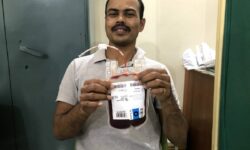THIRUVANANTHAPURAM:
As heart diseases caused by hypertension is on the increase in Kerala it is time that effective preventive strategies are evolved and implemented actively with the support of multiple actors including media, according to experts at a media dialogue held here.
Leading medical practitioners and public health policy makers speaking at the event on Hypertension Management and Elimination of Trans Fatty Acids (TFA) in Kerala, emphasised that creating widespread awareness is a critical component in this process. The event was organised by Disha Foundation, a not-for-profit organisation working in the health sector and MD Niche Media Consultants, a socially committed media organisation.
A recent study by Achutha Menon Center for Health Science Studies reveals that 1 in 3 adults in Kerala has high blood pressure. Significantly, the state also has the highest number of heart diseases caused by high blood pressure in all of India. According to Global Burden of Disease (2016), in Kerala, 65600 people die due to hypertension related causes every year. More males (40.6%) than females (38.5%) suffer from raised blood pressure.
One of the other main reasons for heart diseases is the consumption of food containing trans fatty acids. Kerala loses 2465 people every year due to trans fats. These deaths can be completely avoided by eliminating trans fats from food in Kerala.
Initiating the dialogue, Dr Rathan Kelkar, Food Safety Commissioner, Kerala said there was an urgent need for strict enforcement of Food Safety and Standards Authority of India (FSSAI) regulations. “We have already taken firm step in this regard including, spreading awareness among the public, the food business operators, and monitoring of oils and fats”
Leading cardiologist Dr Tiny Nair, who moderated the dialogue, said, “It is a cause for concern that Indians consume more fats compared to other Asian countries. More young people are suffering from raised blood pressure compared to the situation a couple of decades back.”He also noted that digital instruments and devices should be made available at all points of healthcare delivery system since it is important to ensure accuracy of BP measurement.
Making a presentation on hypertension, which has become a ‘silent killer’ in Kerala, Dr KR Thankappan, Professor, Department of Public Health and Community Medicine, Central University, Kasargod said, “Although 44.3 per cent people with hypertension are aware of their health status, only 13.3per cent have their blood pressure under control. This would mean that people are not taking adequate treatment for hypertension.”
Dr T Longvah, Director Grade Scientist, National Institute of Nutrition (NIN), Hyderabad, said one of the problems is that there is no real data regarding consumption of transfats. “Our food system is changing and we have shifted to processed food. This has an impact on our health. We need mandatory requirements for action by the food service industry that would effectively eliminate consumers’ exposure to TFAs in all manufactured foods.”He also added that there is concern that children, youth and people with low income are consuming worryingly high levels of TFAs in deep-fried takeaway foods.
Moderating a panel discussion on Kerala’s roadmap for better cardiovascular health, Dr B Ekbal, Member, State Planning Board and Architect, Kerala Health Policy 2018, made a strong case for strengthening the public healthcare system down to the primary health centre (PHC) for early detection and screening of people. Citing the example of ‘labelling’, Dr Ekbal said there is a need for bringing hotels and other food outlets under the regulatory ambit.
Dr PS Indu, Head of Community Medicine, Medical College, said “We should come up with healthy alternatives that are in sync with the local culture in addressing the issue of trans fat elimination.” Dr Bipin K Gopal, State Nodal Officer, NCD, DHS, Kerala, noted that rampant urbanisation and changes in lifestyle have contributed to the rise in hypertension in the state.




